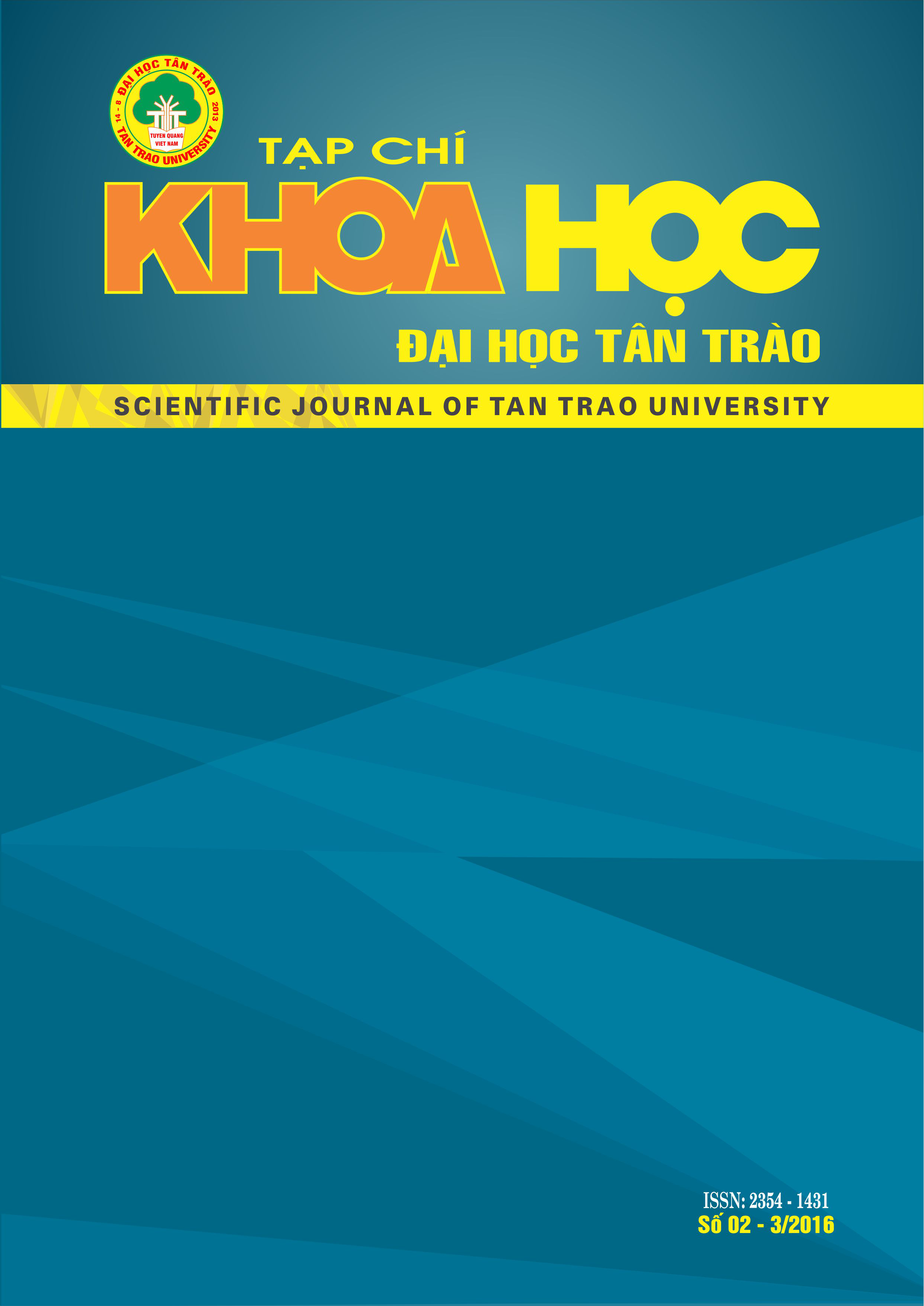Những ảnh hưởng của đạo Khổng tới hoạt động dạy - học ở bậc Đại học tại Việt Nam
DOI:
https://doi.org/10.51453/2354-1431/2016/87Từ khóa:
đạo Khổng; hoạt Ä‘á»™ng dạy-há»c; giao tiếp thầy-tròTóm tắt
Bài viết nghiên cứu về sự ảnh hưởng của đạo Khổng tới việc dạy-học ở các trường Đại học Việt Nam. Bản chất của đạo Khổng và sự ảnh hưởng tại Việt Nam nói chung và lĩnh vực giáo dục nói riêng đã được khái quát. Ngoài ra, bài viết tập trung sâu vào việc phân tích những ảnh hưởng của đạo Khổng tới hoạt động dạy-học tại các trường Đại học tại Việt Nam đặc biệt là những ảnh hưởng đã ít nhiều kìm hãm sự sáng tạo và hiệu quả của hoạt động dạy-học. Cuối cùng bài viết phân tích và nhấn mạnh những gì mà các nhà giáo dục Việt Nam đã làm và nên làm để mềm hóa và giảm bớt ảnh hưởng của đạo Khổng tới việc dạy-học ở bậc Đại học tại Việt Nam.
Tải xuống
Tài liệu tham khảo
1. Ban, K. T.(2000) The impacts of Confucian on learning environment. Hanoi Education University Publisher.
2. Bruner, J.(1996) The culture of education. Harvard University Press, Cambridge Mass.
3. Cuu, N. L. (2001). Communication in classroom. Vietnamese Educational Newspaper.
4. Chen, G.M & Chung, J. (1994). The impact of Confucianism on organizational communication. Communication Quarterly. University Part. 42 (2), pp 93-112.
5. Driscoll, M.P. (1994). Psychology of Learning for Instruction. Needham Heights: Allyn & Bacon.
6. Ellis, G., 1995. Teaching and learning styles in Vietnam: Lessons for Australian educators. Journal of Vietnamese studies, 8, pp 9-16.
7. Darling, L. H. & Bransford, J.(2005) Preparing Teachers for a Changing World: What Teachers Should Learn and Be Able to Do. Jossey-Bass.
8. Fry, H., Ketteridge, S. & Marshall. (1999) Understanding student learning. Development of practice.
9. Hwang, K. K. (1986). The psychology of the Chinese people. HK: Oxford University Press.
10. McLaren, M. (1998). Interpreting culture differences. Peter Francis publisher. UK
11. Merriam, S.B.; Caffarella, R.S. & Baumgartner, L.M. (2007) Learning in Adulthood. John Wiley & Sons, Inc.
12. Hofstede, G. (1991). Cultures and Organizations: Software of the mind. HarperCollinsPublishers. London.
13. Irwin, H. (1996). Communicating with Asia: Understanding People and Customs. Allen & Unwin. NSW, Australia.
14. Kramsch, C. & Sullivan, P. (1996). Appropriate pedagogy. ELT journal, (50), 199-212
15. Nelson (1995). Cultural differences in learning styles. In Reid, J (Ed.), Learning styles in the ESL/EFL classroom. Boston: Heinle & Heinle.
16. Nguyen, X. T. (1994). Education in Vietnam: an overview. In Nguyen Xuan Thu (Ed.).
17. Nguyen, K. D. (1999). The teacher training quality. The People. Vietnam: The People newspaper.
18. Onsman. (1991: 51&52) Asignment of Instructional Strategies to Adult Learning Principle.
19. Print, M. (1993) Curriculum Development and Design. Sydney: Allen and Unwin.
20. Phu, N. M.(2001) A sympathy towards students. Hanoi National University Publisher
21. Sullivan, K. (1994). Understanding ways. London: Hale & Ironmoger.
22. Turner, R. B.(2005) Expert Teaching: Knowledge and Pedagogy to Lead the Profession. London. David Fulton Publisher.
23. Tran, T. N. M. & Nguyen, T. T. H. & Le, L. L. (1988). Vietnamese Language & Cultures. Australia: Vietnamese Community in Australia.
24. Vu, V. T. (1995). Some cultural features of Vietnamese life and teacher education. In Barthel & Ho, V. (Eds.) & Alex & Dinh, Q. T.(trans). Intercultural interaction and development: converging perspectives conferences proceedings. Sydney: University of technology.
25. Wei, T. (1977). Vietnamese refugee students: A handbook for personnel. Cambridge: National Assessment & Dissemination center.
Tải xuống
Đã Xuất bản
Cách trích dẫn
Số
Chuyên mục
Giấy phép

Tác phẩm này được cấp phép theo Giấy phép Quốc tế Creative Commons Attribution-ShareAlike 4.0 .
Bài báo được xuất bản ở Tạp chí Khoa học Đại học Tân Trào được cấp phép theo giấy phép Ghi công - Chia sẻ tương tự 4.0 Quốc tế (CC BY-SA). Theo đó, các tác giả khác có thể sao chép, chuyển đổi hay phân phối lại các bài báo này với mục đích hợp pháp trên mọi phương tiện, với điều kiện họ trích dẫn tác giả, Tạp chí Khoa học Đại học Tân Trào và đường link đến bản quyền; nêu rõ các thay đổi đã thực hiện và các nghiên cứu đăng lại được tiến hành theo cùng một bản quyền.
Bản quyền bài báo thuộc về các tác giả, không hạn chế số lượng. Tạp chí Khoa học Tân Trào được cấp giấy phép không độc quyền để xuất bản bài báo với tư cách nhà xuất bản nguồn, kèm theo quyền thương mại để in các bài báo cung cấp cho các thư viện và cá nhân.
Mặc dù các điều khoản của giấy phép CC BY-SA không dành cho các tác giả (với tư cách là người giữ bản quyền của bài báo, họ không bị hạn chế về quyền hạn), khi gửi bài tới Tạp chí Khoa học Đại học Tân Trào, tác giả cần đáp ứng quyền của độc giả, và cần cấp quyền cho bên thứ 3 sử dụng bài báo của họ trong phạm vi của giấy phép.


